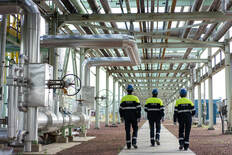- The steam cracker will produce ethylene, a key raw material for various industries.
- The environmental permit application includes an OVR and EIR.
- Public consultation will start for 30 days once the permit is declared complete.
- Project ONE aims for climate neutrality within 10 years using advanced technologies.

Project Overview
INEOS Olefins Belgium has submitted an environmental permit application for Project ONE, a state-of-the-art steam cracker in Antwerp. This facility will produce ethylene, a crucial raw material for various industries including cosmetics, textiles, electronics, household appliances, food packaging, medical applications, automotive, wind turbines, construction, and water transportation.
Environmental Considerations
The application includes an environmental safety report (OVR) and an environmental impact report (EIR) that assess the cumulative environmental effects from preparatory works through to construction and operation. INEOS has addressed comments from an earlier permit application to create a fully integrated submission.
Public Consultation
Once the permit application is declared complete and admissible by the Province of Antwerp, it will be fully disclosed and communicated. This will initiate a 30-day public consultation period, during which a public information meeting will be organized.
Technological Innovation
Project ONE’s ethane cracker will have carbon emissions three times lower than the average European cracker and less than half of the top 10% best-performing European crackers. This innovation will set a new benchmark within the European Emissions Trading System (ETS), compelling older, less efficient crackers to reduce emissions, buy allowances, or close.
Future Goals
Project ONE aims to achieve climate neutrality within 10 years from start-up. The facility is designed to integrate new technologies as they become available, such as carbon capture and storage, the use of 100% hydrogen as fuel, and potential electrification of cracking furnaces.

